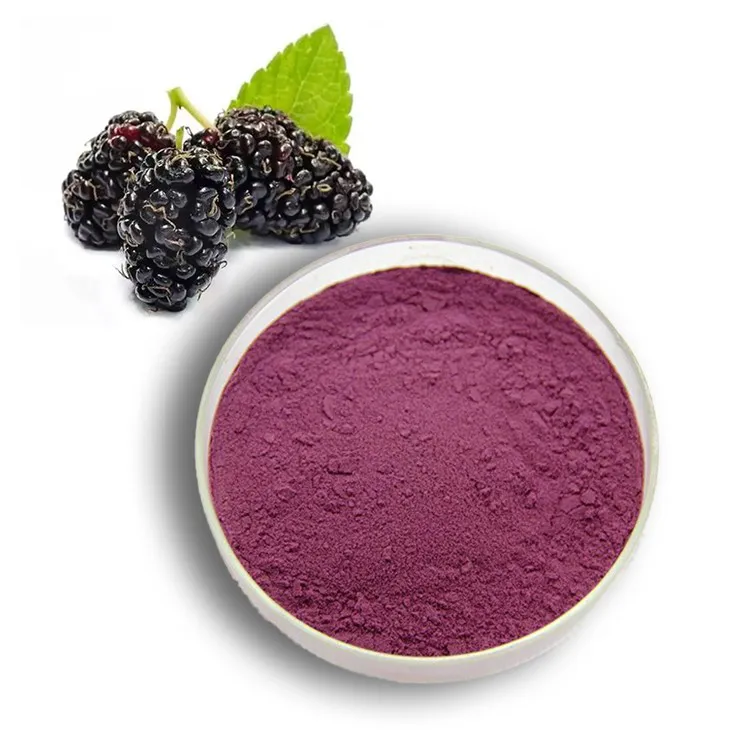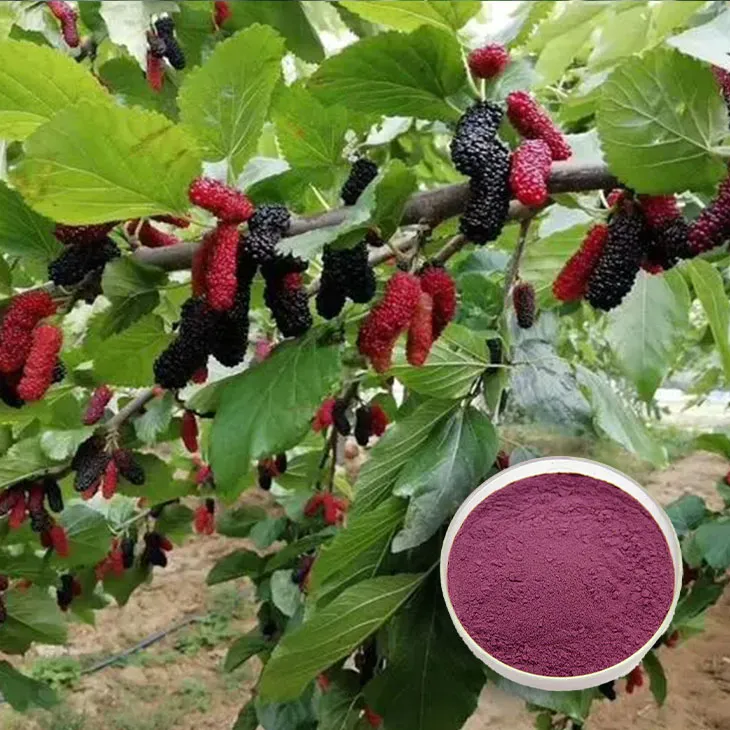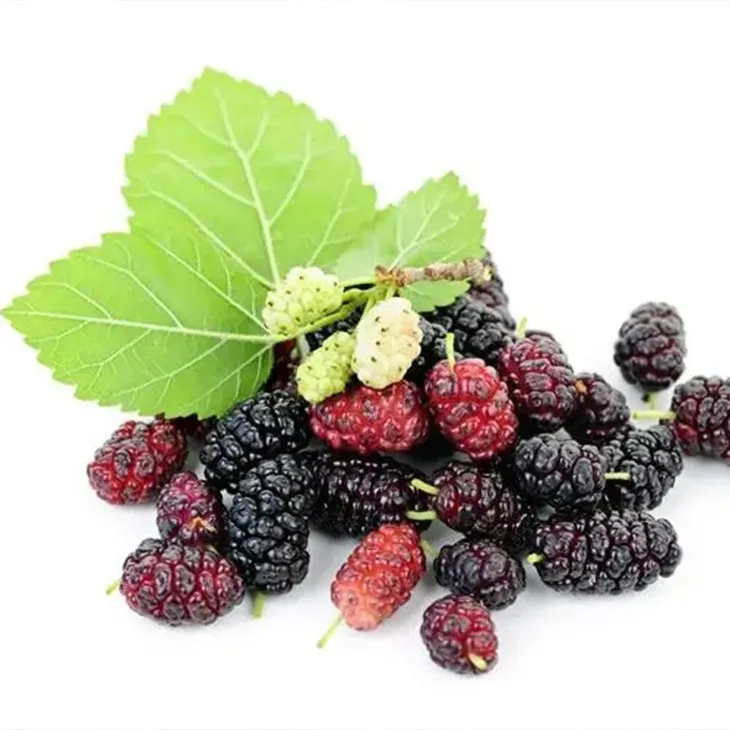- 0086-571-85302990
- sales@greenskybio.com
Expert Tips for Effective Wholesale Mulberry Extract Purchasing.
2024-12-19

Introduction
Mulberry Extract has gained significant popularity in various industries, including the food, beverage, and health - supplement sectors. When it comes to wholesale purchasing of Mulberry Extract, it is crucial to approach the process with knowledge and caution. This article will provide expert - guided tips on regulatory compliance, product specifications, and price negotiation to ensure successful wholesale purchases.

Regulatory Compliance
Know the Local and International Regulations
1. Domestic Regulations: Different countries have their own regulations regarding food additives and dietary supplements. For example, in the United States, the Food and Drug Administration (FDA) has specific guidelines for the safety and labeling of Mulberry Extract if it is used in food or supplement products. Sellers need to ensure that the mulberry extract they are purchasing complies with these local regulations. This may include restrictions on certain ingredients, maximum allowable levels of contaminants, and proper labeling requirements.
2. International Standards: If you are involved in international wholesale trade, it is essential to be aware of international standards such as those set by the Codex Alimentarius Commission. These standards can help ensure that the mulberry extract meets quality and safety requirements across different markets. For instance, they may define the acceptable levels of heavy metals, pesticides, and other substances in the extract.
Documentation and Certification
1. Certificate of Analysis (CoA): A reliable supplier should be able to provide a CoA for the mulberry extract. This document details the chemical and physical properties of the extract, including its active ingredient content, purity, and any potential contaminants. The CoA serves as proof of the quality of the product and is crucial for regulatory compliance.
2. Good Manufacturing Practice (GMP) Certification: Suppliers with GMP certification are more likely to follow strict manufacturing processes and quality control standards. This certification indicates that the production facility has proper hygiene, quality management, and documentation procedures in place. When purchasing mulberry extract wholesale, it is advisable to choose suppliers with GMP - certified facilities.
3. Organic Certification: If you are dealing with organic mulberry extract, the product should have the appropriate organic certification. This ensures that the mulberry plants were grown without the use of synthetic pesticides, fertilizers, or genetically modified organisms (GMOs). Organic certification can add value to the product, especially for customers who prefer organic ingredients.

Product Specifications
Active Ingredient Content
1. Understanding the Active Compounds: Mulberry extract contains various active compounds such as flavonoids, anthocyanins, and resveratrol. The concentration of these compounds can vary depending on the extraction method and the quality of the raw materials. It is important to know the desired active ingredient content for your intended application. For example, if you are using the extract in a dietary supplement for its antioxidant properties, you may need a higher concentration of flavonoids.
2. Guaranteed Minimum Content: When negotiating with suppliers, ensure that they can guarantee a minimum content of the active ingredients. This can be specified in the contract or on the product label. A reliable supplier should be able to provide consistent batches with the promised active ingredient levels.
Extraction Method
1. Different Extraction Techniques: There are several extraction methods for mulberry extract, including solvent extraction, supercritical fluid extraction, and enzymatic extraction. Each method has its own advantages and disadvantages in terms of cost, efficiency, and the quality of the final extract. For instance, supercritical fluid extraction can produce a high - quality extract with a high concentration of active compounds, but it is also more expensive.
2. Impact on Product Quality: The extraction method can significantly affect the quality of the mulberry extract. A poor extraction method may result in a lower yield of active ingredients, the presence of unwanted impurities, or a change in the chemical structure of the active compounds. It is essential to understand how the extraction method used by the supplier can impact the final product's quality and suitability for your needs.
Appearance and Solubility
1. Physical Appearance: Mulberry extract can come in different forms, such as powder, liquid, or capsule. The physical appearance of the extract should be consistent across batches. For example, if you are purchasing powder - form extract, it should have a uniform color and texture. Any variation in appearance may indicate a problem with the manufacturing process or the quality of the raw materials.
2. Solubility: Depending on its intended use, the solubility of the mulberry extract may be an important factor. For use in beverages or liquid formulations, a highly soluble extract is preferred. Suppliers should be able to provide information on the solubility characteristics of their product and any recommended dissolution methods.

Price Negotiation
Market Research
1. Understanding the Market Price Range: Before entering into price negotiations, it is crucial to have a good understanding of the current market price range for mulberry extract. This can be achieved by researching industry reports, consulting with other wholesalers, or monitoring online marketplaces. Knowing the average price will give you a benchmark for negotiating with suppliers.
2. Factors Affecting Price: There are several factors that can influence the price of mulberry extract. These include the quality of the raw materials, the extraction method used, the scale of production, and the supplier's cost structure. For example, high - quality mulberry plants sourced from organic farms will generally result in a more expensive extract. Understanding these factors will help you assess whether a supplier's price is reasonable.
Negotiation Strategies
1. Quantity - Based Discounts: One of the most common negotiation strategies is to ask for quantity - based discounts. If you are purchasing a large volume of mulberry extract, you should be able to negotiate a lower price per unit. Suppliers are often willing to offer discounts for bulk orders as it helps them reduce their production and distribution costs.
2. Long - Term Contracts: Offering to sign a long - term contract with a supplier can also be an effective negotiation strategy. In return for a guaranteed purchase volume over an extended period, you can ask for more favorable pricing terms. Long - term contracts provide suppliers with stability and predictability in their sales, which they may be willing to reward with lower prices.
3. Comparing Multiple Suppliers: Don't settle for the first supplier you come across. Instead, compare prices and terms from multiple suppliers. This will give you more leverage during negotiations as you can use the offers from other suppliers as a reference point. However, it is important to also consider other factors such as product quality and regulatory compliance when comparing suppliers.
Conclusion
Wholesale purchasing of mulberry extract requires careful consideration of regulatory compliance, product specifications, and price negotiation. By following the expert - guided tips in this article, you can make more informed decisions and ensure successful wholesale purchases. Remember to always stay updated on the latest regulations, product developments, and market trends to maintain a competitive edge in the wholesale mulberry extract business.
FAQ:
What are the key regulatory requirements for wholesale mulberry extract?
When it comes to wholesale mulberry extract, regulatory requirements can vary by region. In general, it must meet food or dietary supplement safety standards. For example, in the United States, it needs to comply with FDA regulations regarding labeling, ingredient safety, and manufacturing processes. In the European Union, it must adhere to directives on food supplements. Additionally, there may be restrictions on certain contaminants, such as heavy metals and pesticides, to ensure consumer safety.
How can I ensure the product specifications of mulberry extract are up to par?
To ensure product specifications are satisfactory, start by examining the Certificate of Analysis (COA). This document should detail important aspects like the active ingredient content (e.g., the amount of anthocyanins in mulberry extract). Check for the purity level, which should be clearly stated. Also, look at physical characteristics such as solubility and color. Compare the product specifications with industry standards or recognized quality benchmarks. If possible, request samples from different suppliers to conduct in - house tests or evaluations.
What are the best strategies for price negotiation in wholesale mulberry extract?
Firstly, do your research on the market price range for mulberry extract. Know the average cost from multiple reliable sources. Then, when approaching suppliers, be clear about your volume requirements. Larger volumes often lead to better price breaks. Highlight your long - term potential as a customer, which can make the supplier more inclined to offer a favorable price. Point out any competitors' offers that are more attractive in terms of price but without sacrificing quality. Be prepared to negotiate on non - price terms as well, such as delivery schedules and payment terms, which can sometimes result in overall cost savings.
How do I find reliable suppliers for wholesale mulberry extract?
Look for suppliers with a good reputation in the industry. Check online reviews and testimonials from other customers. Industry directories can be a valuable resource. Verify that the supplier has proper certifications, such as Good Manufacturing Practice (GMP) certification. A GMP - certified supplier is more likely to have quality control processes in place. Ask for references and contact other businesses that have sourced from the potential supplier. Also, consider attending trade shows or industry events where you can meet suppliers face - face and assess their professionalism and knowledge.
What are the common quality issues in mulberry extract and how to avoid them?
One common quality issue is inconsistent active ingredient content. This can be avoided by regularly testing samples from the supplier and having strict contractual agreements regarding the minimum and maximum levels of key ingredients. Another issue is contamination, either from the raw materials or during the manufacturing process. To prevent this, ensure the supplier has proper quality control measures in place, such as regular testing for contaminants and following strict hygiene standards. Oxidation can also affect the quality of mulberry extract. Suppliers should use appropriate packaging materials and storage conditions to minimize oxidation.
Related literature
- Title: Mulberry Extract: Properties, Production, and Quality Control"
- Title: "Regulatory Aspects of Herbal Extracts in the Global Market: A Focus on Mulberry Extract"
- Title: "Price Determinants in the Wholesale Market of Botanical Extracts: The Case of Mulberry Extract"
- ▶ Hesperidin
- ▶ citrus bioflavonoids
- ▶ plant extract
- ▶ lycopene
- ▶ Diosmin
- ▶ Grape seed extract
- ▶ Sea buckthorn Juice Powder
- ▶ Beetroot powder
- ▶ Hops Extract
- ▶ Artichoke Extract
- ▶ Reishi mushroom extract
- ▶ Astaxanthin
- ▶ Green Tea Extract
- ▶ Curcumin Extract
- ▶ Horse Chestnut Extract
- ▶ Other Problems
- ▶ Boswellia Serrata Extract
- ▶ Resveratrol Extract
- ▶ Marigold Extract
- ▶ Grape Leaf Extract
- ▶ blog3
- ▶ blog4
- ▶ blog5
-
Pure 85% Tomentil Extract.
2024-12-19
-
Pine bark Extract Powder
2024-12-19
-
Panax Ginseng Leaf Extract
2024-12-19
-
Shikonin
2024-12-19
-
Aminolevulinic acid
2024-12-19
-
Selenium yeast
2024-12-19
-
Polygonum Cuspidatum Extract
2024-12-19
-
Echinacea Extract
2024-12-19
-
Aguaje Extract
2024-12-19
-
Saponin Extract
2024-12-19
-
Sea buckthorn Juice Powder
2024-12-19





















